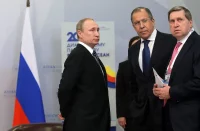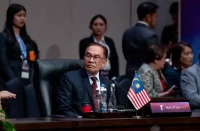The G20 summit in Buenos Aires is over. The vast majority of news and articles focussed on the issues discussed and how the leaders got onwith each other (especially the nuances of the relationship betweenpresidents Vladimir Putin and Donald Trump), but there was nostructural analysis of the event. Namely, what exactly is the G20 inrelation to the global political system? And what could such meetingslead to in future?
It is obvious that the members of this forum differ from the G7 on anumber of criteria, although their original ideology was the same.
Initially, the G20 was an attempt to create a pool of crisis managers on a global scale. The group’s origins are rooted in the Asian crisis ofthe late 1990s, which also affected Russia and a number of EasternEuropean, African and Latin American countries. In 1997, the G33 wasformed – a group of 33 countries that was replaced in 1999 by theG22, which itself lasted for less than a year before quickly givingway to the G20. It has always been emphasised that, collectively, theG20 represents approximately 85 per cent of global gross nationalproduct and 75 per cent of global trade.
In addition, the G20 has been influenced by the political decisions and proposals emanating from the G7. Following the 2008 financial crisis,the G20 summit was held in Washington, with the following two takingplace in London and Pittsburgh. Moreover, the official agenda of thesummits was aimed at strengthening the financial sector andpreventing protectionism, reinforcing the global financial andeconomic system, and introducing measures to steer the global economytowards sustainable growth.
First, the G20 consists of representatives from the First and Second Worlds as classified by Western political analysts. Second, a significant proportion of these representatives are, if not fundamentally different, then at least considerably different from the G7 in termsof culture and world outlook. Moreover, these differences have aneffect on proposed agreements and discussions within the G20. Third,they are not bound by a system of alliances and commitments like themembers of the G7.
The other members of the G20 that are not part of the G7 have important features that should also be noted.
Russia. A former superpower that, for a long time, stood up against the equally strong power that is America. The country was a member of the G8 until recently, but has no plans to return. Reason – culturaland geopolitical differences with other members (7), which are unitedon the principles of liberal democracy, capitalism, a legacy ofimperialism, parliamentary democracy and military alliance (partially through NATO, otherwise through bilateral relations with theirpatron, America).
Argentina, Brazil and Mexico – three geopolitical poles of Latin America. While Argentina and Brazil seem to have taken a step backwards following the recent presidential elections, a move that could beregarded as payback by right-wing forces in the region (which aretraditionally geared towards America), there has been a slight shiftto the left in Mexico following López Obrador’s recent victory(and, accordingly, the defeat of the right-wing, which in and ofitself is a serious sign that voters’ political preferences arechanging). Slight because Obrador is a populist. It is stillimportant, however, given the global trend of popular forces comingto power in a variety of countries. The significantly worsened socialand economic situation in Argentina and Brazil is also making a swingback to the left possible, should the conditions be right.
The Middle East is represented by Turkey and Saudi Arabia. Turkey is at a crossroads and is performing a balancing act between the interests ofother major powers. Saudi Arabia is pursuing a more straight forward policy, although in recent years it has demonstrated a willingness to carry out certain reforms in both its domestic and foreign policies.For a long time, both countries were satellites of America in theregion and are familiar with the way Washington works. Both Turkey and Saudi Arabia know that the US will not allow any one power to gettoo strong in the Middle East (otherwise various pretexts would beused to put a coalition together to stop this emerging power ashappened with Iraq and as is happening now with Iran, albeit usingnon-military methods), but both countries still have an appetite fordomination. What’s more, Turkey and Saudi Arabia represent theIslamic factor in the group, which is something that cannot be saidof the G7.
China undoubtedly plays a leading role in the G20 and in world politics as a whole. The country’s Belt and Road Initiative was one of the keytopics at the recent summit, which suggests that it is not the East adapting to the West, but rather the other way around. Half of the members of the G20 have a close relationship with China.
Australia is of interest because the country has clearly been changing its identity in recent years. Once a typically Western country, it is becoming more and more Asian (in the regional rather than the ethnic sense), which is reflected in a number of documents. Australia is increasingly identifying with the Asia-Pacific Region and the surrounding area. Hence it has to change its behaviour in the international arena.
South Korea is essentially a minion of the US. Recently, however, like anumber of other satellites, its dependence on Washington has been making it feel uncomfortable, so the country has been feeling its way towards more sovereign policies. Its rapprochement with North Koreais an important process that would allow Seoul to operate more independently.
South Africa is the only African voice in the G20. Although Nigeria’s economic performance is fairly good, the country is not allowed into organisations like these for some reason. It is strange that Egypt was never invited to join the G20, despite showing social and economic growth on the eve of the Arab Spring, and also Algeria – amajor energy power in North Africa. However, Egypt was a member ofthe G20’s predecessor – the G33 – as was Morocco.
Indonesia is another Muslim power (the country also has a sizeable Catholic minority), although Islam in the Pacific region is different from thecontinental version. Indonesia’s membership of the G20 is not downto its religion, however, but its economic potential. Furthermore, itis the most populous country in the Pacific Ocean and throughout theIslamic world. It is also of considerable geopolitical importance,since its territory is stretched out over a wide area and borders theIndian Ocean.
It is interesting that, as well as the individual European members that duplicate the G7, the European Union is also represented in the G20by the president of the European Commission and the president of theEuropean Council.
Representatives of various international organisations are also usually present atG20 meetings, including the Financial Stability Board, theInternational Monetary Fund, the World Trade Organization, the United Nations, and the World Bank Group.
The situation is different now compared with previous meetings. The G7summit in Canada this July showed that there is no consensus even among old allies representing the collective West. They could noteven manage to issue a final communique, leading some to say that thegroup was moving from an influential organisation to an acronym. Andit goes without saying that the blame for this was laid at DonaldTrump’s door.

Hence the recent G20 meeting was a more relaxed affair without regard to Washington. It was the fifth meeting since the Ukrainian coup d’etat of February 2014, and so the fifth since the West (the G7 in itsentirety) introduced sanctions against Russia. And while the issue of global economic stagnation used to be top of the bill, it seems completely illogical to raise the issue now given the current sanctions regime (and Russia’s counter-sanctions). How can you talk about global economic development if one of the key geopolitical players is being put under tremendous pressure in every way possible, but first and foremost economically? Or perhaps global economic growth is regarded differently in the West than in other regions. This becomes truer if you analyse the global financial and economic structure and the role of its main beneficiaries.
If you look at the etymology of the Greek word krisis, you will see that it means “decision, turning point”, rather thana change for the worse that needs to be addressed. In this regard, the G20’s anti-crisis agenda is a clear attempt by the West to preserve its hegemony and domination – putting other emerging powers at the wheel of controlled processes rather than allowing them to make adequate decisions. As such, the existence of the G20 seems extremely undesirable. Considering that there is growing disharmony within the group, however, the forum should be used to develop experimental alternatives. This is exactly what non-Western countriesare trying to do by creating a parallel association at the foreignminister level. It is also telling that the G20 includes every BRICS member. In this format, the G20 could still be of real benefit to theworld.














This article is nor impartial.